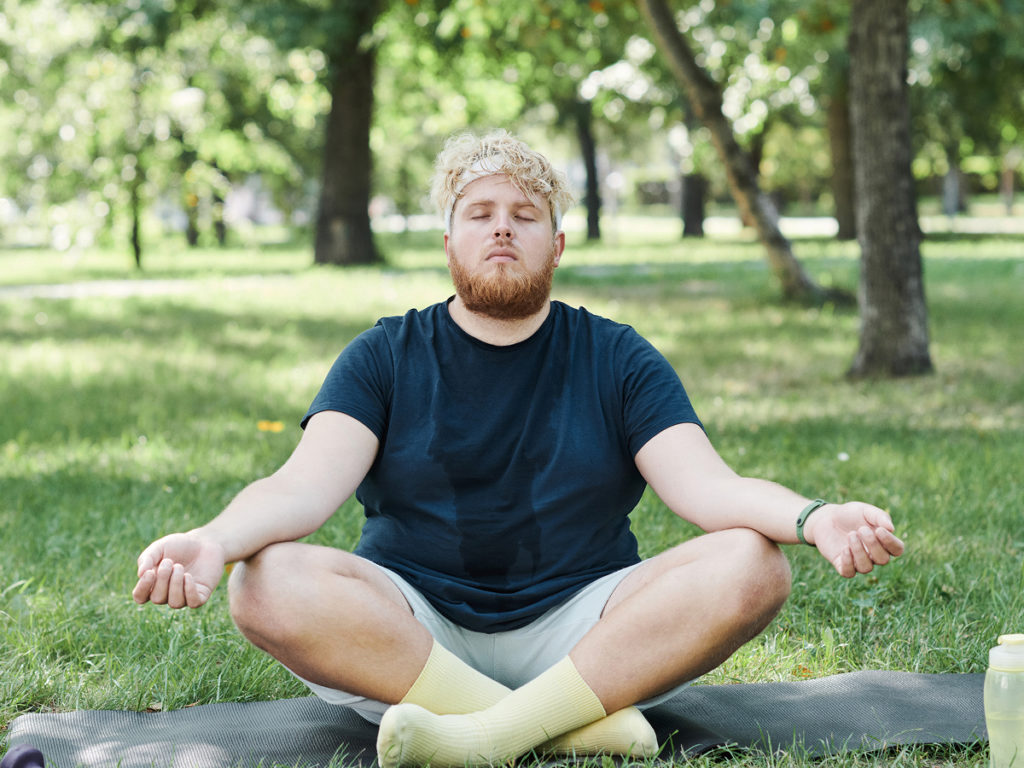Stress and anxiety are very common emotional experiences. They may be situational — only occurring around specific events like public speaking, exams, or job interviews — but persistent anxiety, fear, or panic can indicate underlying health conditions. Many people can reduce anxiety or stress with self-help techniques, professional support, or a combination of both. Let’s explore some strategies to help improve your mental well-being.
Types of anxiety disorders
Anxiety disorders can encompass a variety of mental health conditions, including phobias, obsessive-compulsive disorder, panic disorder, and post-traumatic stress disorder. Persistent anxiety symptoms can manifest as physical responses like an increased heart rate, rapid breathing, or restlessness, and vary significantly from person to person. Two of the most common anxiety disorders are generalised anxiety disorder (GAD) and social anxiety disorder.
Generalised anxiety disorder
Generalised anxiety disorder (GAD) is characterised by excessive, frequent, and unrealistic worry about everyday things such as job responsibilities, health, or chores. It can increase your risk of sleeping difficulties, low mood, and concentration issues, which can have a significant impact on your daily life. People with GAD may experience a constant feeling of being overwhelmed, involving fear and worry. [1]
Social anxiety disorder
Social anxiety disorder, formerly known as social phobia, is an intense and ongoing fear of social situations. People with social anxiety disorder may experience symptoms such as rapid breathing, increased heart rate, and restlessness in everyday interactions. This can have an impact on school, work and interpersonal relationships. [2]
If you think you have a severe, underlying anxiety disorder, help is available. Speak to your GP about your symptoms — they can help you find a treatment plan that suits your needs.
Techniques for managing anxiety
Stress management practices such as meditation, breathing exercises, and mindfulness can help alleviate symptoms of anxiety in the moment. Here’s how.
Deep breathing exercises
Taking slow, even deep breaths can help restore your regular breathing patterns and alleviate physical symptoms of anxiety, such as a fast heart rate or dizziness. [3] Try to focus on letting your lungs fully expand and inhale from your diaphragm, rather than your chest.
Mindfulness
Evidence suggests that mindfulness — or focusing on your present feelings, sensations and thoughts as they unfold — helps promote calmness and emotional balance, which can help reduce feelings of anxiety [4].
Meditation
Like mindfulness, meditation can help you manage stress and anxiety by reducing negative thoughts and helping you stay present [5]. You can practise meditation in many ways, from taking a yoga class to focusing on your breathing on your daily walk.
Long-term stress reduction
There are also some lifestyle changes you can implement that can reduce stress and improve your overall mental health.
Regular physical activity
Exercise can improve your mental health in many ways. It can help ease anxiety symptoms by reducing levels of adrenaline and cortisol — two stress hormones — in your body. [6] Moving also promotes the release of endorphins, which are feel-good chemicals often associated with a ‘runner’s high’. Research shows as little as 20 to 30 minutes of exercise a day can help improve your mental health.
Healthy eating habits
Eating a balanced diet incorporating vegetables, fruits, whole grains, and fish into your diet may be linked to reduced anxiety, though more research is needed to confirm this connection. Cutting down on substances that can increase anxiety symptoms, such as caffeine, alcohol and nicotine, can also have long-term benefits for your mental health. [7, 8, 9]
Good sleep quality
Not getting enough sleep is widely associated with mental health conditions such as anxiety and depression. [10, 11] When you’re sleep deprived, you’re more likely to feel fatigued and irritable, which can make you vulnerable to stress. And when you’re feeling stressed, you’re also more likely to experience poor sleep quality. [12] Most adults should aim for 7–9 hours of sleep a night. Sticking to a bedtime routine, limiting screentime and creating a relaxing environment can all help improve your sleep quality.
Creating a support system
Having people around you when you’re going through a difficult time can help you open up about how you’re feeling — whether it’s friends, family or people in your community. Your support system can help relieve everyday pressures and provide comfort, which can help you focus on your well-being.
Treatments for anxiety
If you’re experiencing persistent anxiety that affects your daily life, seeking professional help may be the right choice for you. Your GP can diagnose an underlying condition and discuss treatment options and coping mechanisms to help you reduce your symptoms.
Therapy can help you understand your anxiety triggers and implement techniques to help you manage your symptoms when they arise. Cognitive behavioural therapy (CBT), for example, can help you alter your thought patterns, helping you control your emotional responses. [13] Exposure therapy can also help you acclimatize to situations that frequently cause anxiety. [14]
Medications such as antidepressants are also used to manage anxiety disorders. Common types of antidepressants prescribed for anxiety include SSRIs and SNRIs, which adjust brain chemicals to improve mood and reduce stress. [15] Anxiety medications mainly target symptoms, and are often most effective when combined with other treatments like therapy.
References:
- NHS. Generalised Anxiety Disorder (GAD) [Internet]. nhs.uk. NHS; 2024. Available from: https://www.nhs.uk/mental-health/conditions/generalised-anxiety-disorder-gad/
- NHS. Social Anxiety (social phobia) [Internet]. nhs.uk. NHS; 2023. Available from: https://www.nhs.uk/mental-health/conditions/social-anxiety/
- Bentley TGK, D’Andrea-Penna G, Rakic M, Arce N, LaFaille M, Berman R, et al. Breathing practices for stress and anxiety reduction: Conceptual framework of implementation guidelines based on a systematic review of the published literature. Brain Sciences [Internet]. 2023 Nov 21;13(12). Available from: https://pmc.ncbi.nlm.nih.gov/articles/PMC10741869/
- Hoge EA, Bui E, Marques L, Metcalf CA, Morris LK, Robinaugh DJ, et al. Randomized controlled trial of mindfulness meditation for generalized anxiety disorder. The Journal of Clinical Psychiatry [Internet]. 2013 Mar 13;74(08):786–92. Available from: https://www.ncbi.nlm.nih.gov/pmc/articles/PMC3772979/
- Goldin PR, Thurston M, Allende S, Moodie C, Dixon ML, Heimberg RG, et al. Evaluation of cognitive behavioral therapy vs mindfulness meditation in brain changes during reappraisal and acceptance among patients with social anxiety disorder. JAMA Psychiatry. 2021 Jul 21;78(10):1134–42.
- Exercising to relax [Internet]. Harvard Health. Harvard Health Publishing; 2020. Available from: https://www.health.harvard.edu/staying-healthy/exercising-to-relax
- Muhammad Liaquat Raza, Motahareh Haghipanah, Nasrollah Moradikor. Coffee and stress management: How does coffee affect the stress response? Progress in brain research. 2024 Jan 1;288:59–80.
- Yang W, Singla R, Maheshwari O, Fontaine CJ, Gil-Mohapel J. Alcohol Use Disorder: Neurobiology and Therapeutics. Biomedicines [Internet]. 2022 May 1;10(5). Available from: https://www.mdpi.com/2227-9059/10/5/1192
- Kim SJ, Chae W, Park WH, Park MH, Park EC, Jang SI. The impact of smoking cessation attempts on stress levels. BMC Public Health [Internet]. 2019 Mar 6;19(1). Available from: https://bmcpublichealth.biomedcentral.com/articles/10.1186/s12889-019-6592-9
- Neckelmann, D. et al., Chronic Insomnia as a Risk Factor for Developing Anxiety and Depression, Sleep. 2007; 30 (7): 873-880.
- Weissman, M. et al., The Morbidity of Insomnia Uncomplicated by Psychiatric Disorders, General Hospital Psychiatry.1997; 19(4): 245–250.
- Sleep and Mood [Internet]. sleep.hms.harvard.edu. Available from: https://sleep.hms.harvard.edu/education-training/public-education/sleep-and-health-education-program/sleep-health-education-87#Neckelmann
- Curtiss JE, Levine DS, Ander I, Baker AW. Cognitive-behavioral Treatments for Anxiety and stress-related Disorders. Focus [Internet]. 2021;19(2):184–9. Available from: https://www.ncbi.nlm.nih.gov/pmc/articles/PMC8475916/
- Catanese L. Exposure therapy: What is it and how can it help? [Internet]. Harvard Health. 2024. Available from: https://www.health.harvard.edu/mind-and-mood/exposure-therapy-what-is-it-and-how-can-it-help
- NHS. Overview – SSRI Antidepressants [Internet]. NHS. 2021. Available from: https://www.nhs.uk/mental-health/talking-therapies-medicine-treatments/medicines-and-psychiatry/ssri-antidepressants/overview/

